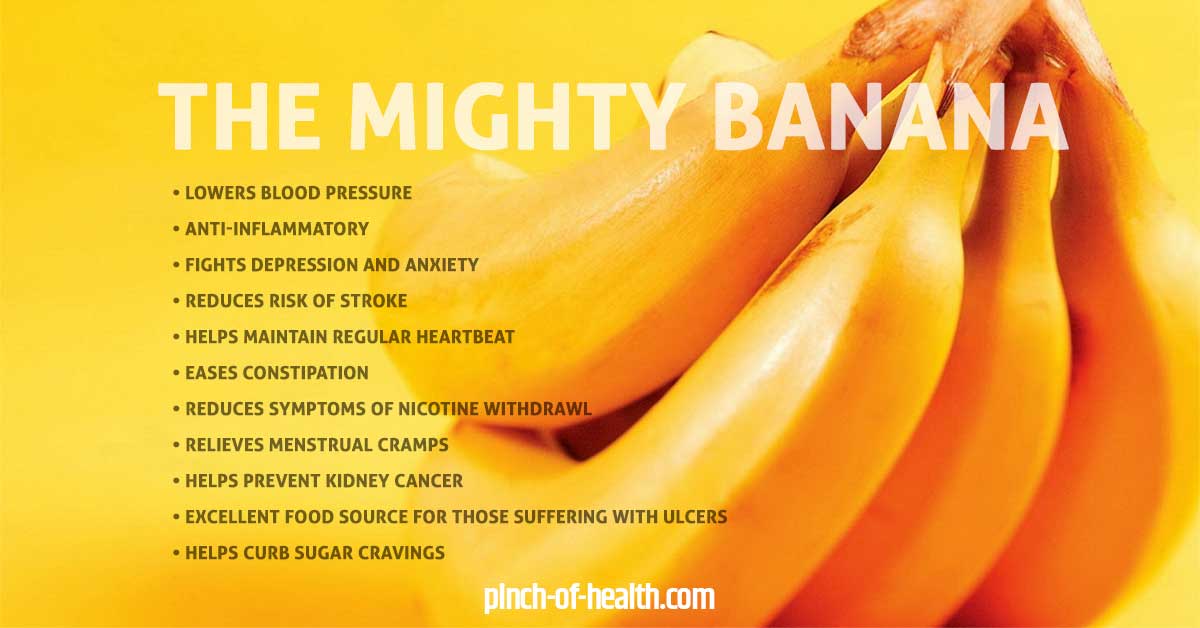1 – Are bananas fattening?
Benefits of bananas for weight loss
Bananas are relatively low in calories and high in dietary fiber, with an average banana containing about 100 calories. Bananas contain pectin, a soluble fiber which helps to control blood sugar levels and reduce appetite after eating.1✅ JOURNAL REFERENCE
DOI: 10.1093/ajcn/48.6.14132✅ JOURNAL REFERENCE
DOI: 10.1016/S0016-5085(82)80010-3
Pectin also promotes satiety (the feeling of fullness), and helps to slow down digestion. Fiber rich vegetable and fruit consumption has been associated with people having a lower body weight.3✅ JOURNAL REFERENCE
DOI: 10.1080/07315724.2013.7911944✅ JOURNAL REFERENCE
DOI: 10.1016/j.nut.2009.08.009
Green banana resistant starch
The riper and more yellow a banana is, the higher it is in sugars. The greener a banana is, the higher it is in resistant starch, an indigestible starch with fiber-like properties. The resistant starch in green bananas can curb cravings between meals by helping to control blood sugar levels. Resistant starch can help in increasing the thermic effect of food, which in turn increases energy expenditure (calorie burning).5✅ JOURNAL REFERENCE
DOI: 10.1080/10408398.2011.629352
Animal studies have shown an association between consumption of resistant starch and a reduction in abdominal fat.6✅ JOURNAL REFERENCE
DOI: 10.3945/an.114.007419
Nutritional values of bananas per 100g (1 medium banana = approximately 118g):
- How many calories in a banana – 89
- How much protein in a banana – 1.1g
- How many carbs in a banana – 23g
- What is the fat content of a banana– 0.3g
2 – Bananas for diarrhea
In a study, 3 groups of children with diarrhea were tested. The 1st group was treated with a diet which included bananas, the 2nd group was treated with pectin, and the 3rd group was given plain rice.
Eighty-two percent of the banana group recovered within 4 days.7✅ JOURNAL REFERENCE
DOI: 10.1023/b:ddas.0000020507.25910.cf
What is banana oil:
Banana oil is the common term for the chemical compound correctly referred to as amyl acetate (C7H14O2). It’s a clear liquid ester derived from amyl alcohol, and despite the fact that its scent strongly smells like bananas, it isn’t found in part of the banana tree.
It’s made use of in a variety of products, such as chewing gum and perfume (for its flavor and its odor), and nail polish remover (for its solvent capability).
3 – Bananas and blood pressure
Bananas are full of nutrients, particularly potassium. The helpfulness of potassium-rich foods like bananas in reducing blood pressure has been well researched.
Potassium helps to regulate heart function and also fluid balance, an important factor in the regulation of blood pressure.8✅ JOURNAL REFERENCE
DOI: 10.1007/s11906-011-0197-8
How much potassium in a banana:
An average sized banana has 440 milligrams of potassium.
4 – Bananas for muscle cramps
Low levels of potassium are known to increase risk of muscle cramps, and bananas are a good source of potassium.
A study has shown that consuming bananas an hour before exercising keeps potassium levels higher after exercise.9✅ JOURNAL REFERENCE
DOI: 10.4085/1062-6050-47.6.05
Can you freeze bananas?
Peel the bananas and with a butter knife cut into small slices for smoothie machines and bigger sizes for baking. Place them in Ziploc freezer bags in a horizontal position and lay the bags flat in the freezer. Now every time you need a frozen banana you can easily grab a whole banana, half or just one little piece.
5 – Bananas and asthma
Results of a study suggest that a higher consumption of bananas could protect against wheezing in children with asthma.10✅ JOURNAL REFERENCE
DOI: 10.1183/09031936.00097806
Although uncommon, allergies to bananas could however aggravate asthma symptoms.
6 – Bananas for peptic ulcers
Due to the high content of the soluble fiber pectin in bananas, they are very soothing to the gastrointestinal tract. The pectin helps to normalize bowel function and has shown some promise for treating peptic ulcers.
Bananas contain compounds called protease inhibitors which help eliminate harmful bacteria like H. Pylori, which is considered responsible for the majority of stomach ulcers.
7 – Bananas for healthy eyes
Bananas are a source of vitamin A, which promotes good vision, particularly in low light.
In a study at the University of Queensland, Brisbane, Australia, it was concluded that bananas are a potential food source for alleviating vitamin A deficiency.11✅ JOURNAL REFERENCE
DOI: 10.1177/156482650302400401
Bananas are also a good source of other eye-healthy nutrients such as beta carotene, vitamin E, vitamin C and lutein, is a nutrient that can help reduce macular degeneration risk.
8 – Bananas and kidney cancer
Research has revealed that women who consumed bananas 4 to 6 times a week had a 50% lower risk of developing kidney cancer in comparison to women who didn’t eat bananas.
Individuals who already have kidney cancer should however avoid eating potassium rich bananas
9 – Bananas for healthy bones
The calcium, potassium, magnesium and vitamin K content in bananas are all nutrients important for bone health and protecting protect against osteoporosis.
Bananas contain fructooligosaccharides, which help to improve the absorption of minerals such as calcium.
10 – Bananas and depression
Bananas are considered a good mood food as they are high in tryptophan, an essential amino acid which is converted into 5-HTP, which is subsequently converted into the mood lifting brain neurotransmitter serotonin.
Bananas are also a good source of vitamin B9, or folate, a nutrient that helps metabolize serotonin. Individuals suffering from depression have on average 25% lower folate levels.
Nutrients in bananas
Bananas are a fantastic source of potassium as well as vitamin B6. They are a good source of fiber, magnesium, biotin, riboflavin, carbohydrates and vitamin C.
Where do bananas come from?
The banana originated in Malaysia around 4,000 years ago. Bananas were introduced to the Americas by Portuguese explorers during the late fifteenth century. Although bananas grow in virtually all tropical and subtropical regions, the main commercial producers are Mexico, Costa Rica, Brazil and Ecuador.



